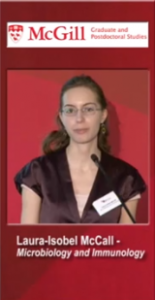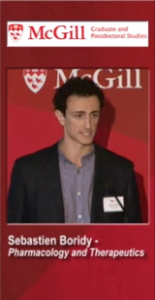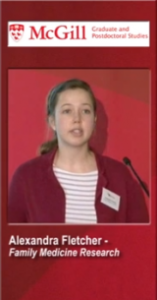 Explore the contributions and diversity of McGill’s graduate research!
Explore the contributions and diversity of McGill’s graduate research!
Organized by McGill’s Office of Sustainability, Graduate and Postdoctoral Studies, and the Post-Graduate Students Society, Three Minutes to Change the World features McGill graduate students summarizing their research initiatives and highlighting the importance of their work to the community at large.
The event is an excellent opportunity for students to share their valuable research, to perfect their elevator pitch and presentation skills, and to network with their peers across disciplines – It takes all kinds of knowledge to change the world and thesis research from all disciplines is showcased!
Unlike most other 3 minute thesis events, 3 Minutes to Change the World in not a competition. It is a cooperative event across disciplines where selected students work together to showcase their contributions and learn to effectively and concisely explain their research contributions to a general audience.
On March 21, 2013, Laura Isobel McCall, Sebastien Boridy and Alexandra Fletcher presented a three-minute presentation appropriate for a non-specialist audience. Laura Isobel McCall
Laura Isobel McCall
Microbiology and Immunology
“Live Vaccination Against a Deadly Disease: Targeting Visceral Leishmaniasis”
Billions of people are infected with parasites many eventually die of these diseases, and yet there are no human vaccines available against parasitic disease. Laura-Isobel McCall looks to develop a naturally attenuated vaccine – meaning a vaccine developed from a related milder disease that would protected against more severe diseases. This naturally attenuated parasite will need many more changes before it is suitable for humans, but it does represent a step forward in the study of naturally attenuated live vaccines against a deadly parasitic infection.
Watch Laura’s video presentation here.
Sebastien Boridy Department of Pharmacology and Therapeutics, Ph.D. candidate 
“Nanoparticles to Treat Brain Disorders: Thinking BIG about Something Small”
Advances in nanotechnology and biomaterials have allotted us with the opportunity to overcome this challenge by designing “smart” drug delivery systems that can sense and pinpoint injuries when and where they happen. Therefore, drugs accumulate at the site of injury, in turn, reducing side effects incurred by drug activity at off-target sites. Moreover, we can design such systems to cater to individual patient needs, creating a prominent avenue for personalized medicines. Sebastien laboratory team focuses on applying this research to improve the treatment and diagnosis of debilitating brain disorders, such as Alzheimer’s disease, stroke, and brain tumours. By employing such methods, they are hoping to improve the health of Canadians by developing smarter and more reliable medicines.
Watch Sebastien’s video presentation here.
 Alexandra Fletcher
Alexandra Fletcher
Family Medicine Research, Master’s candidate
“Participatory Research: What’s in it for me?”
Only 14% of innovations in clinical research are transplanted to the primary care setting, and this process takes about 17 years. This is not because the research is faulty, but rather the assumptions behind knowledge diffusion are. If you want your research results to be used towards improving welfare, you can’t operate in a vacuum. Participatory research is about involving all stakeholders affected by the research process in an effort to improve uptake of research results upon completion of the project. Participatory research recognizes the range of individuals who all have valuable knowledge that can contribute to improving the feasibility of a project.
Watch Alexandra’s video presentation here.
Click here to watch the 2013 event.
July 2013
